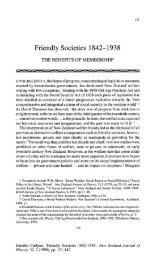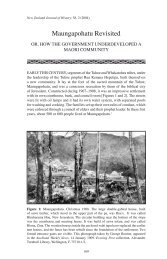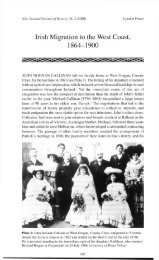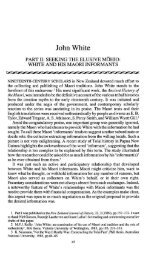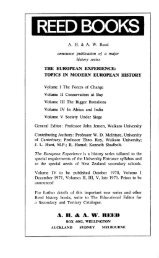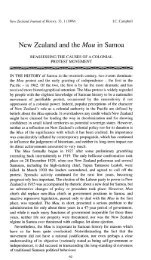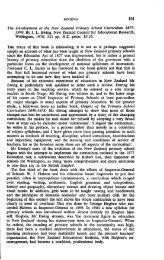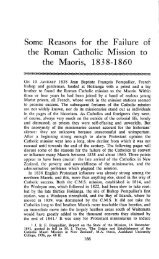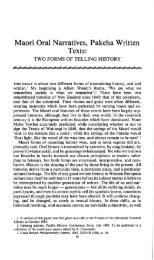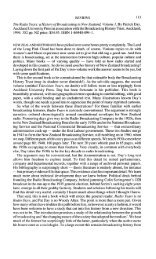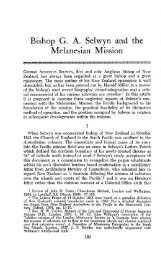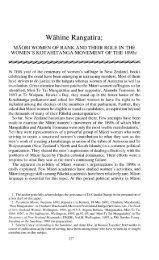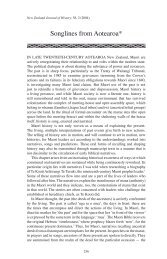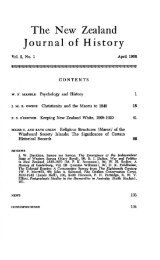Maori Oral Narratives, Pakeha Written Texts: - New Zealand Journal ...
Maori Oral Narratives, Pakeha Written Texts: - New Zealand Journal ...
Maori Oral Narratives, Pakeha Written Texts: - New Zealand Journal ...
Create successful ePaper yourself
Turn your PDF publications into a flip-book with our unique Google optimized e-Paper software.
MAORI ORAL NARRATIVES, PAKEHA WRITTEN TEXTS 19<br />
I can tell my own story about my great-grandmother, because she was a follower of<br />
Te Kooti. Well, I come from the Bay of Plenty. That's how I know — my greatgrandmother<br />
— she was a staunch follower of Te Kooti. When she was a young<br />
woman, they transported her with all the other <strong>Maori</strong>s around Gisborne to Chatham<br />
Islands. Whakarau they call them. My great grandmother was one of the whakaraus<br />
[the captives], I remember her saying to me when I was a girl, oh, they were driven<br />
from Opotiki on the buggies to Poverty Bay, all the Ringatus in those days. Oh, it<br />
was sad. They were taken to the wharf, and Captain Porter' was with the soldiers in<br />
those days, the red coats she calls them, 'nga hoia koti wherowhero — koti toto' —<br />
eh?' And she calls, 'Captain, captain!' 'Hurry up, hurry up! Go on the boat. Go on<br />
the boat!' And Te Kooti called out to that fellow, Porter, 'When I come back (in<br />
<strong>Maori</strong>), when I come back I will slay you!' Which he did, when he did come back.<br />
. . . They were there for about two years. Then she came back .... She was with<br />
him too, for a little while, at Te Kuiti [living in exile]. Then when her first husband<br />
died she went back to Torere. She brought us all up; four generations she brought<br />
up.<br />
She was a makutu old lady, and I didn't realize it until I grew up and they told me<br />
that my great-grandmother had some mana. Some power. She could destroy, you<br />
know. You did something wrong against her, she just prayed. Some kind of prayer<br />
that she uses, and it reacts on to that person. . . . That mana was given to her by Te<br />
Kooti. Te Kooti bestowed it upon her.'<br />
This woman's focus here is that her own knowledge, and her right to<br />
speak, derives from her great-grandmother. Her account conveys an alternative<br />
history, the perspectives of the whakarau. It opens up other worlds<br />
of causation.<br />
In a similar manner, her husband recounted the narrative of his grandfather,<br />
Te Hira Uetuku, and Te Kooti.<br />
My grandfather, he went there [Te Kuiti], in 1878. There was a lot of confusion with<br />
this land, Mangatu. So they said over here, 'Go and see Te Kooti'. So he went to see<br />
Te Koot', and when he got there — Te Kooti had a habit of misleading people to test<br />
you at all times to see how good your faith is. Well, he was going there and tell Te<br />
Kooti, 'Oh, what's going to happen to this land that belongs — that my greatgrandfather<br />
has fought for? What's going to happen to it?' In other words, he's<br />
going there for his family in preserving and maintaining his rights to the land. So Te<br />
Kooti said to him, 'Well, now that you're here, I see you people are very tired —<br />
here's a bottle of whisky.' And my grandfather — well, his friends all got that bottle<br />
of whisky, all had a drink, but my grandfather refused. My grandfather said, 'No. I<br />
came for a purpose and my mission is about the land. Mangatu.' Then, I think he put<br />
a curse on the ones that already had a drink of that bottle —<br />
Heni: That's my family! My people! They're all dead now!<br />
Ned: Te Kooti said, 'Oh well, I'll give you something — he mauri. He mauri mo<br />
te whenua.' Pertaining to some powers unknown to us. That he will preserve your<br />
7 There is a confusion in this narrative between Captain Thomas Porter and Captain<br />
Reginald Biggs, both of whom were instrumental in having Te Kooti sent into exile. Te Kooti<br />
subsequently killed Biggs in reprisal.<br />
8 'the soldiers with the red coats — bloody coats'.<br />
9 Conversation with Heni Brown, Whatatutu, 14 February 1982.



